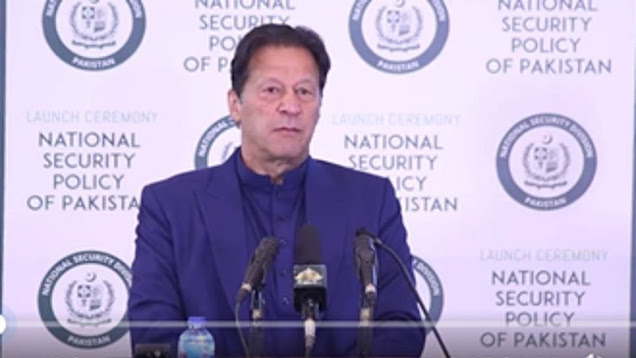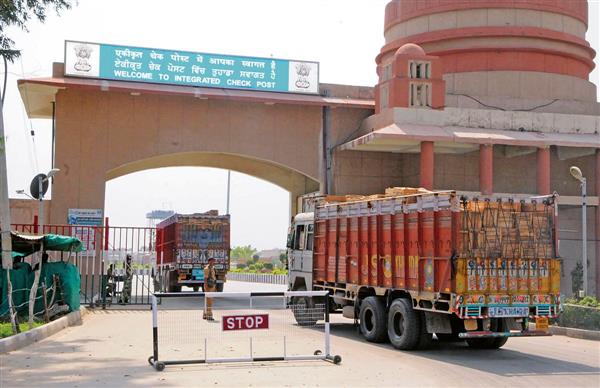Pakistan's farce of peace
Pakistan announced its national security policy last week. The policy calls for 100 years of peace with neighbouring countries. It wants peace with India and resumes trade between the two countries. Pakistan's economy is on the brink of bankruptcy, with a heavy debt burden on it and heavy international pressure has been mounted on Pakistan. The dual role of Pakistan is not new, as it continues to feed the terrorists on the one hand and to paint a picture of ongoing peace efforts on the other. The nexus of Pakistan and China poses a threat to India's national security on both sides of the border, and unless Pakistan abandons its policy on the issue of terrorism, there is no reason for India to look into such a farce of peace.
Pakistan's Prime
Minister Imran Khan announced the national security policy a few days ago. This
policy has a total of 100 pages. Of these, 50 pages have been declared and 50
pages have been kept confidential. Pakistan has said that economic ties are at
the heart of the policy. A Pakistani official said he was looking at the policy
as a guideline for Pakistan's foreign, international and defence policy. This
policy will be reviewed annually. It was also clarified that the new government
may change this policy. Also, while resuming trade with India, a final
settlement has not been reached on the Kashmir issue, yet the language of
resumption of trade is expressed in it.
Relations between India
and Pakistan have been strained for the last 70 years. Pakistan has
consistently tried to tarnish the image of India over Kashmir, terrorism,
infiltration borders and arms embargo violations on the LOC. Since India
declared Jammu and Kashmir as a Union Territory, tensions between the two
countries have risen again since August 2019. Following India's decision,
Pakistan has downgraded diplomatic relations with India. Inside, peace has been
restored. Peace attempts from Pakistan are not new for India. On the one hand,
in 1999, when Nawaz Sharif announced the Lahore Accord, the Pakistani army was
preparing for war by infiltrating Kargil. The two countries had signed a
ceasefire at the LOC in 2003. However, Pakistan continued to violate the
ceasefire and made sure that there was no peace. Terrorist activities continue
unabated, many attacks on India, including the Parliament in 2001, Mumbai in
2008, have been carried out by Pakistan-inspired terrorists. In recent times,
in 2017, Pakistan's army chief Qamar Javed Bajwa had once again promised to
implement the ceasefire. In 2020 and 2021, Pakistan's Prime Minister Imran Khan
and Bajwa have repeatedly called for peace. Economic tensions and the
international image are both trying to show that Pakistan wants a new peace.
Pakistan's economy is
currently going through a challenging situation. Pakistan's economy is under
continuous pressure due to debt burden, debt repayment pressure, economic
slowdown and falling foreign exchange reserves. Pakistan currently has a debt
of over 100 billion USD. Of this, Pakistan has to repay at least 10 billion to
12 billion USD annually. Fuel and other imports are also large. The Central
Bank of Pakistan has to work hard to maintain the foreign exchange reserves
required for both. China is helping them with it. But this is the next step of
China’s debt trap. Moreover, the tensions created by the China-Pakistan
Economic Corridor (CPEC) are making the economy more volatile. The FATF has
maintained pressure on Pakistan for not stopping aid to terrorists. Pakistan is
struggling to comply with the rules of the International Financial Institutions.
As a result, the means of getting help from them have diminished. For all this,
Pakistan needs to change its image.
Trade with India is
also important for Pakistan. Despite tensions between the two countries, trade
was growing slowly. Exports from India to Pakistan increased from 1.92 billion
USD in 2017-18 to 2.07 billion USD in 2018-19. In comparison, imports from
Pakistan to India were. 48.856 crore USD in 2017-18 and. 49.487 crore USD in
2018-19. Commodities exported from India to Pakistan included cotton,
bio-chemicals, plastics, dyes, machinery. So, imports from Pakistan to India
mainly included some minerals, fruits, salt and cement. However, in 2019, the
level of relations between the two countries decreased and after that trade
also declined. A few months back, Pakistan had announced its intention to
re-import cotton from India. The decline in cotton production had hit the local
textile industry hard. Cotton from the US and Brazil was expensive and would
take a long time to supply. Therefore, it was convenient for Pakistan to import
from India.
Aside from the economic
benefits, it is also important for Pakistan to build an international image. At
the international level, too, Pakistan wants to make its position that it is no
longer a country pursuing terrorism. Under the Taliban regime, Pakistan has
sought to project its image internationally. However, its successes are
limited. From that, it seems that Pakistan has once again started trying to
give a voice of peace. Relations between Pakistan and China have always posed a
challenge to India's security. It is easy for China to take Pakistan by the
hand to take action against India and maintain its presence in Afghanistan and
West Asia. This is a simple and cheap weapon for China. So, for Pakistan, China
is a guarantee of security. At the heart of all these equations is the issue of
action against India.
At present, only Turkey
and China appear to be on Pakistan's side. Pakistan's traditional allies Saudi
Arabia and the United Arab Emirates have distanced themselves. Pakistan is
angry at the UAE for inviting India to the Muslim Cooperation Council in the
UAE. However, Pakistan-Saudi Arabia ties at its low, because Pakistan is
reluctant for involvement in the operation in Yemen. Pakistan was also seen
trying to form a group of Muslim countries against Saudi Arabia, holding hands
with ambitious countries like Turkey and Iran. As a result, the United Arab
Emirates and Saudi Arabia have also put pressure on Pakistan to repay its
loans. This is increasing economic pressure on Pakistan.
From this situation,
Pakistan has started a new drama, trying to make peace. Pakistan's President
Zia-ul-Haq had used the language of bloodshed against India with a thousand
cuts. Officials and leaders of Zia's tenure have come to power in Pakistan
today. Therefore, there is no need to believe in any guarantee from Pakistan.
At present, Pakistan needs to make peace with India to survive. There is no
doubt that in the future, when there is a need to take action against India,
Pakistan will again resort to terrorist activities.






Comments